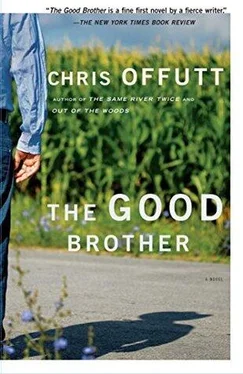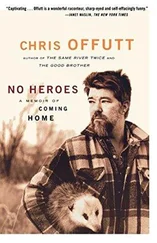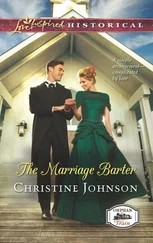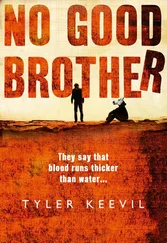He was astonished by the size of the Mississippi River. He left his car and walked along the bank, past beer cans and condoms lying in the weeds. His feet sank in mud. The murky surface rippled like muscle, swirling as if it contained many creeks that twined through its body. He cupped his hands to drink. It tasted bad but he didn’t think a river that big could be poison. In the slanting red light of afternoon the bridge glowed as if the metal had been heated by flame. He returned to his car, placing each step with precision. He felt unbalanced walking such flat terrain, as if he might tip onto his side.
Com in Iowa had been harvested, leaving splintered stalks rising from the earth. Pigs foraged in the fields. Barns sat very near the houses as if to conserve the energy of walking. A flock of dark birds rose from the low remnants of soy, lifting like a blanket to hide the light. Near dusk he reached the Missouri River and stopped at a scenic overlook, curious as to what constituted high elevation on such flat land. A tower rose from a parking lot. He climbed its five open flights to a platform from which he could see Nebraska, a vista that filled him with profound unease. On every horizon lay a tree-line. Abruptly he didn’t know where he was. He began to tremble with such force that he gripped the railing to prevent a fall.
In South Dakota his motel room matched the one in Illinois except for the carpet, which was the color of grass parched by drought. He lay unable to sleep, still feeling the rhythm of the road throbbing in his body. Fragments of Rodale’s death seeped into his mind and he tried to blot them like a stain. He hoped the dog had revived.
After a few hours he woke, confused until memory bludgeoned him and he quickly rose, with no idea of where to go. The empty landscape was flat as tin. He felt like a bug exposed when someone lifted a flat rock. He drove west all day, and in the afternoon, he watched the sun begin its decline. Dusk was short. Kentucky nights began on the ground, in the hollows and the woods, moving upwards to join the sky. Here, the darkness dropped from above.
He made Wyoming by night and slept in a field. In the morning he crossed Dead Horse Creek, a bed of dry grass with no horse in sight. The land was desolate save for oil wells, their steady motion reminding him of chickens pecking for seed. The only shade was in a ditch. A pale blue line etched the horizon, jagged and white, too high for land. He expected a storm until he realized it was the Bighorn Mountains with snow lying along the upper ridges. They rose from the earth like a wall to the west.
He entered Montana through the Crow Reservation. The lack of humidity kept the air clear, making everything appear distinct regardless of distance. The land seemed oddly like a model, as if constructed on miniature scale. Clouds rose in the east while the western sky held the darkness of distant rain. He enjoyed a physical sense of insignificance. The landscape had an inviting quality, seductive but lethal.
A four-door pickup passed him, driven by a young man wearing a western hat. Heavy mudflaps covered the tires. In the rear window hung a lasso with a pair of baby shoes dangling in the center of the coil.
He slept behind a rest stop and rose with the pink dawn, surprised at the lack of grass, dew, and birdsong. The Absaroka Mountains stood in the south, hazed by distance, topped with snow. The hum of silence filled the chilly air. He continued west on I-90, passing a three-tiered stack of hay the size of a house surrounded by a split-rail fence. Though he was driving fast, several cars passed him, and he wondered about Montana’s speed limit. He’d seen no signs.
The land continued to rise. He thought the hill between Bozeman and Livingston was of good heft until he began the long climb to Homestake Pass. At its crest was the Continental Divide, where flat rocks protruded vertically from the earth like plates of stone. He felt bad for the crew who’d built the road, but was deeply envious of the man who’d laid it out. It was the harshest land he’d ever seen.
He began the long descent into Butte, a town sculpted into a mountain, presided over by a giant statue of a woman. He’d left the realm of autumn colors for uniform slopes of conifer trees. The mountains became steep and the valley tight. Several times he crossed the Clark Fork River, shallowed by the season to the size of a creek. Afternoon sun gleamed on great bluffs that rose beyond the water. Logging trails laced the slopes. He arrived in Missoula at dusk, took a room, and slept fourteen hours. After a meal and a short walk, he returned to bed. The next day he slept and ate and slept again.
On the third day Joe Tiller rose early and walked the wide streets of Missoula, his breath visible in the cold air. Many of the low buildings were made of stone, with broad alleys and parking lots behind. There was a spacious quality to the town that was absent in Kentucky. Mist lifted from the mountains to reveal giant white letters made of concrete — an L and an M. He wondered if there were so many mountains that they were coded rather than named. A herd of elk browsed the slopes above the town.
The only open business was the Wolf, its orange sign aglow. Just inside the door was a locked cabinet containing pints of liquor to go, and a long bar where a few men waited for the first drinks of the day. A rifle collection hung from pegs high on the wall. There was no clock. Most of the clientele looked as if they had long ago abandoned a life that revolved around being anywhere at a specific time. Beside the bar, several people were eating breakfast at a low counter. A man slept at a table. A dog slept by the door.
Joe ordered breakfast. As he ate, he dropped a slice of toast, and a grizzled man beside him grinned. “They put stuff on that to make it slippery,” he said. His voice held the jocular camaraderie shared by single men eating public meals alone. In that instant, Joe decided to stay in Missoula.
He looked through the local paper. Work was scarce and the classifieds had a section labeled “For Giveaway” that offered pets and furniture. The cheapest rates were sharing a house, but he knew he couldn’t live with anyone. He shoved the paper away and spilled his coffee, which flowed along the counter toward the man beside him. Joe apologized and the man shrugged.
“I can’t believe how much it costs to live here,” Joe said.
“Movie stars,” the man said. “They’re ruining it for the rest of us.”
He gave Joe a careful look.
“Don’t worry,” Joe said. “I don’t even like movies.”
“This used to be a working man’s town.”
“I’m looking for work, too.”
“I can’t help you there, partner. This is a bad time for it. Maybe in the spring.”
“Shoot, I got to find a place to live first.”
“How fancy you want it?”
“Not too.”
“Used to be, you could rent fishing cabins through the winter up some of these creeks. Might be cold.”
“What creeks?”
“Grant Creek’s out, it’s full of movie stars. Rattlesnake’s crammed with, houses, too. Even little old Lolo Creek’s got million-dollar log cabins on it now. About all that’s left is Rock Creek. Best thing is to drive up there and ask around.”
Joe thanked the man and left the Wolf. At a gas station he stopped behind a convoy that included a six-horse trailer and two pickups. One truck bed was filled with provisions and another held the remains of several elk. Rows of rifles blocked each rear window. The outfit reminded him of a military operation rather than a hunting party, and he thought of men at home emerging from the autumn woods with a rifle in one hand and a gutted deer slung over their shoulders.
Читать дальше












